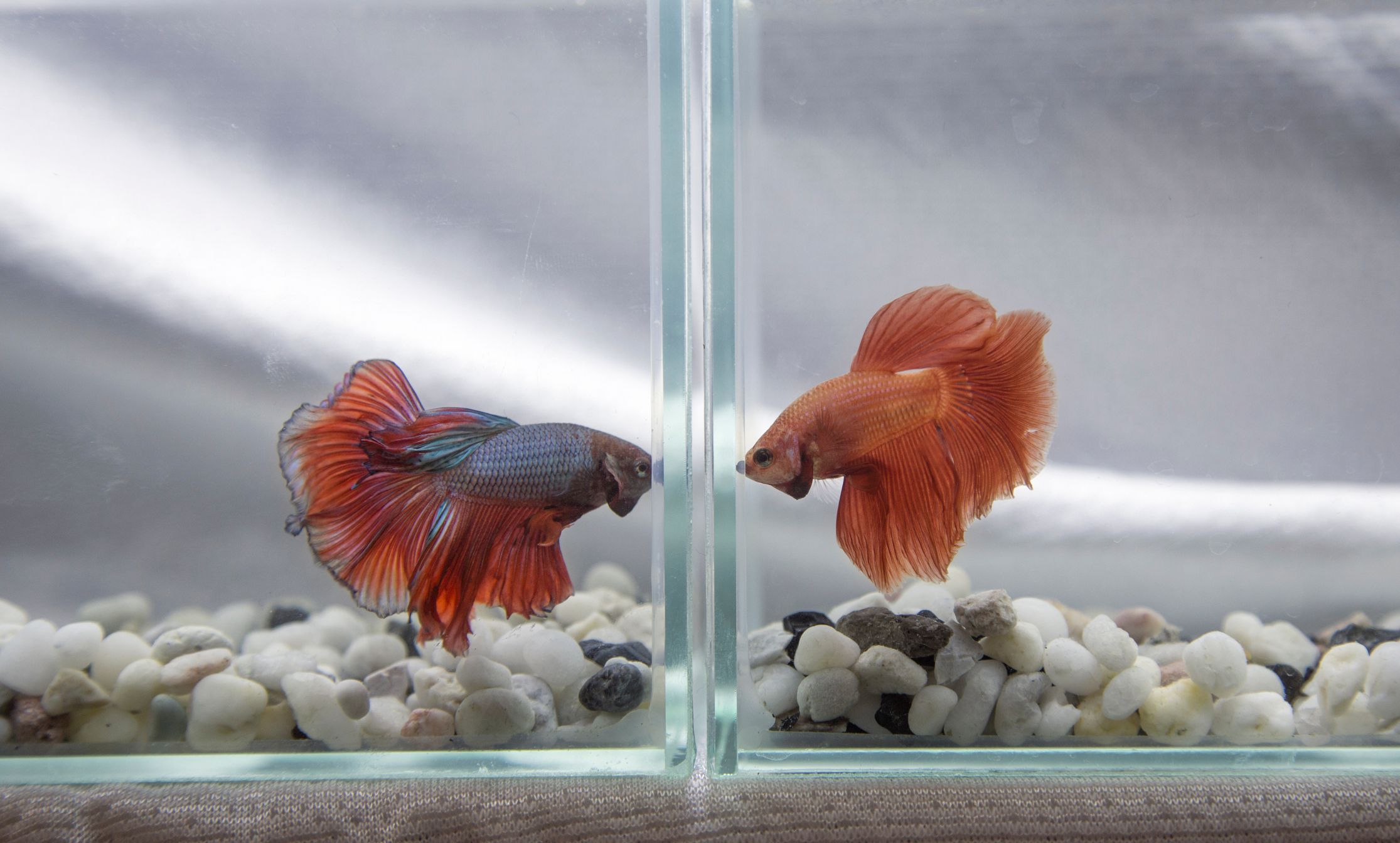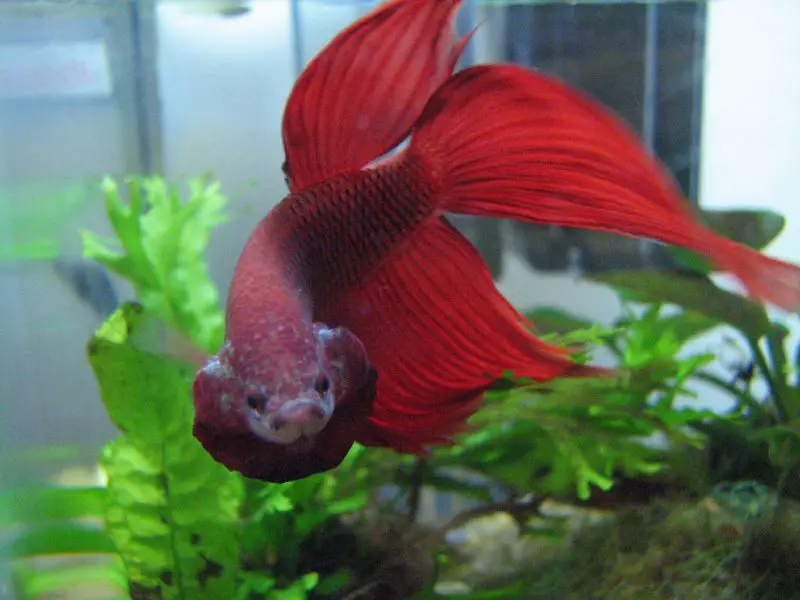Betta fish are known for their vibrant colors and unique personalities, but also for their aggressive behavior. Have you ever wondered why this is the case? In this article, we will explore the reasons behind the aggression of betta fish and how to properly care for them to prevent any harm.
From their natural habitat to their breeding habits, there are various factors that contribute to the aggressive nature of betta fish. By understanding these factors, we can provide a safe and healthy environment for our finned friends while also appreciating their unique characteristics. So, let’s dive in and learn more about why betta fish are so aggressive!
Betta fish are known for their aggressive behavior because of their territorial nature. Male bettas, in particular, are highly territorial and will fight with other male bettas to defend their space. They are also known to flare their gills and fins in response to perceived threats. It is important to provide bettas with adequate space and hiding spots to reduce aggressive behavior.

Why Are Betta Fish So Aggressive?
Betta fish are known for their vibrant colors and flowing fins, but they are also notorious for their aggressive behavior. Unlike other fish species, male bettas are extremely territorial and will often fight to the death when placed in the same tank. But why are betta fish so aggressive? Let’s take a closer look.
1. Betta Fish Are Anabantids
Betta fish belong to the Anabantidae family, also known as labyrinth fish. These fish have a unique labyrinth organ that allows them to breathe air directly from the surface of the water. This adaptation allows bettas to survive in low-oxygen environments like stagnant ponds and rice paddies. However, it also means that bettas are highly territorial and intolerant of other fish in their personal space.
Benefits of Betta Fish Being Anabantids:
– Betta fish can survive in low-oxygen environments, making them hardy and adaptable.
– The labyrinth organ allows bettas to breathe air directly from the surface, reducing the need for a highly oxygenated tank.
2. Male Bettas Are Highly Territorial
Male bettas are notoriously aggressive towards other males, especially when they are in breeding mode. In the wild, male bettas will aggressively defend their territory and breeding rights. This behavior is hardwired into their genetic makeup and is not something that can be trained out of them.
Benefits of Male Bettas Being Highly Territorial:
– Male bettas are excellent guard fish and will fiercely defend their territory from predators.
– Their territorial nature makes them interesting and engaging pets to observe.
3. Female Bettas Can Also Be Aggressive
While not as aggressive as males, female bettas can also exhibit territorial behavior. This is especially true when they are placed in a tank with other females or when breeding is involved. Female bettas will establish a hierarchy within their group, with the dominant female asserting her dominance and keeping the others in check.
Benefits of Female Bettas Being Aggressive:
– Female bettas can be kept together in a sorority tank, providing a unique and interesting dynamic to observe.
– Their aggression can be channeled into play, such as adding toys or obstacles to their tank for them to interact with.
4. Betta Fish Have A Unique Diet
Betta fish are carnivores and require a high-protein diet to thrive. In the wild, they feed on insects, larvae, and small crustaceans. In captivity, they can be fed a variety of live, frozen, or dried foods. However, if their diet is not properly balanced, they can become more aggressive.
Benefits of Betta Fish Having A Unique Diet:
– A high-protein diet helps betta fish maintain their vibrant colors and flowing fins.
– A varied diet can help reduce aggression and improve overall health.
5. Poor Tank Conditions Can Make Bettas Aggressive
Betta fish require specific tank conditions to thrive. They prefer warm, clean water with a pH between 6.5 and 7.5. If their tank is too small, dirty, or lacks proper filtration, it can cause stress and aggression.
Benefits of Maintaining Proper Tank Conditions:
– A clean and well-maintained tank can reduce stress and aggression in betta fish.
– Proper tank conditions can help bettas live longer, healthier lives.
6. Betta Fish Need Adequate Space
Betta fish require a minimum tank size of 5 gallons to thrive. They need adequate swimming space and room to establish their territory. If they are cramped or overcrowded, it can lead to stress and aggression.
Benefits of Providing Adequate Space:
– A larger tank provides more room for betta fish to swim and explore, reducing stress and aggression.
– A well-decorated tank with hiding places, plants, and toys can provide mental stimulation and reduce boredom.
7. Betta Fish Are Sensitive To Water Conditions
Betta fish are sensitive to changes in water temperature, pH, and chemical levels. Sudden changes can cause stress and aggression. It’s important to regularly monitor water conditions and make gradual changes if necessary.
Benefits of Maintaining Stable Water Conditions:
– Stable water conditions can reduce stress and aggression in betta fish.
– Regular water tests can help detect potential health issues before they become serious.
8. Betta Fish Can Be Trained
While betta fish cannot be trained in the traditional sense, they can learn to recognize their owners and respond to certain cues. For example, some bettas will learn to come to the surface for food when their owner approaches the tank.
Benefits of Training Betta Fish:
– Training betta fish can provide mental stimulation and improve their overall well-being.
– It can also create a stronger bond between betta and owner.
9. Betta Fish Can Be Kept With Other Species
While male bettas cannot be kept together, they can be housed with certain other species in a community tank. It’s important to choose tank mates that are peaceful and have similar tank requirements.
Benefits of Keeping Betta Fish With Other Species:
– A community tank can provide a more diverse and interesting aquarium experience.
– It can also provide mental stimulation and reduce boredom for betta fish.
10. Different Types Of Bettas Have Different Personalities
There are many different types of betta fish, each with their own unique personality and traits. Some are more aggressive than others, while some are more social. It’s important to research the specific type of betta you are interested in before bringing it home.
Benefits of Understanding Different Types Of Bettas:
– Understanding the personality and traits of different types of bettas can help you choose the best fit for your lifestyle and tank setup.
– It can also provide a more fulfilling and enjoyable pet ownership experience.
In conclusion, betta fish are aggressive due to their genetics, unique diet, and territorial nature. By providing proper tank conditions, a balanced diet, and mental stimulation, betta fish can thrive and exhibit less aggressive behavior. Understanding the specific needs and traits of different types of bettas can also provide a more fulfilling pet ownership experience.
Frequently Asked Questions
Betta fish are known for their aggression, but why are they so aggressive? Here are some frequently asked questions about the behavior of betta fish.
What makes betta fish so aggressive?
Betta fish are naturally territorial and aggressive. In the wild, they live in shallow waters with limited resources, so they have to defend their territory and resources from other fish. This aggression is also a part of their mating behavior, as males will fight each other for the right to mate with a female.
In captivity, betta fish are often kept in small tanks or bowls, which can exacerbate their aggression. They may become stressed or bored without enough space or stimulation, causing them to lash out at other fish or even their own reflection.
Can betta fish live with other fish?
While betta fish can live with other species of fish, they are not always compatible with all types. They should be kept with fish that are peaceful, non-aggressive, and similar in size. Avoid keeping them with fish that have long, flowing fins, as they may mistake them for another betta and attack them.
It’s also important to provide plenty of hiding places and decorations in the tank to help reduce aggression and territorial behavior. Adding plants, caves, and other structures can create separate areas for fish to retreat to if they feel threatened.
How do you prevent betta fish from fighting?
The best way to prevent betta fish from fighting is to keep them in separate tanks. Male bettas should never be kept together, as they will almost always fight. Female bettas may be kept together, but it’s important to have a large enough tank with plenty of hiding places to reduce aggression.
If you do want to keep other fish with your betta, choose peaceful species that won’t compete for resources or provoke aggression. Introduce new fish slowly and monitor their behavior closely to ensure they are compatible.
Do betta fish need a filter?
Yes, betta fish need a filter to keep their water clean and healthy. A filter will help remove waste and toxins from the water, reducing the risk of disease and illness. Without a filter, the water in the tank can quickly become polluted, leading to poor health and even death for your fish.
It’s important to choose a filter that is appropriate for the size of your tank and the type of fish you have. A filter that is too strong can create a strong current that may stress out your betta, while a filter that is too weak may not be effective at keeping the water clean. Regular water changes are also important to maintain good water quality.
Can betta fish recognize their owners?
While betta fish don’t have the same level of intelligence as dogs or cats, they can recognize their owners to some extent. They may become more active or excited when they see you, or they may swim up to the surface of the water when you approach the tank.
To build a bond with your betta, try feeding them by hand or interacting with them regularly. They may even learn to follow your finger or respond to your voice over time.

Why do betta fish fight? | Why are bettas aggressive?
In conclusion, betta fish are aggressive due to their natural instincts and territorial behavior. They are known to fiercely guard their territory and will attack any perceived threats. This behavior is especially evident in males, who are more aggressive than females.
While aggression is a natural trait for betta fish, it can be mitigated by providing a suitable environment that mimics their natural habitat. This includes providing enough space, hiding spots, and plants for them to explore and feel secure in their space.
In summary, betta fish aggression is not something that can be completely eliminated, but it can be managed through proper care and providing a suitable environment. By doing so, you can enjoy the beauty and unique personality of these fascinating creatures in your aquarium.
